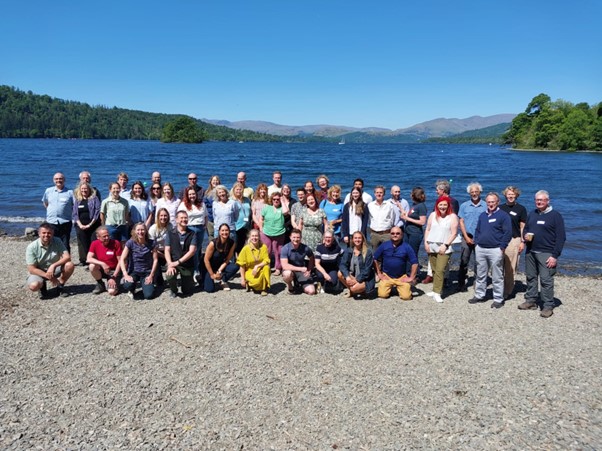On a sunny Friday in May, freshwater scientists from the UK and the Netherlands gathered at the Windermere Jetty Museum for a workshop convened by the UK Centre for Ecology & Hydrology (UKCEH) and the Netherlands Institute of Ecology (NIOO). Dr Heather Moorhouse reflects on a day of knowledge exchange in a fitting location by the shores of England’s largest lake...
Our one-day workshop brought together freshwater ecologists, water industry personnel and researchers from the Netherlands and UK to share personal perspectives on managing freshwater ecosystems. Being in such a welcoming space ensured a sense of positivity and shared purpose, proving the value of learning from others with fresh ideas and enthusiasm.
I co-led the day with my colleagues Dr Stephen Thackeray and Dr Ellie Mackay from UKCEH’s Aquatic Ecosystems group in Lancaster and Dr Sven Teurlincx from NIOO, bringing insights from our research on the Cumbrian Lakes.
The day was structured around two key themes. The morning focused on the current state of freshwaters in the UK and the Netherlands, while the afternoon explored what is needed to build resilience in these ecosystems for the future. Each session included keynote talks followed by panel discussions and contributions from the audience, encouraging collaborative reflection and exchange.

The governance of freshwaters in both the UK and the Netherlands faces a pivotal moment as we approach the 2027 deadline for meeting targets under the Water Environment Regulations 2017 and the EU Water Framework Directive. ln the UK this is linked to the 25-year Environment Plan’s goal of ‘clean and plentiful water’.
Both countries’ failure to meet “good ecological status” targets under the EU Water Framework Directive emerged as a key point of discussion throughout the day. Ongoing issues of nutrient enrichment, emerging contaminants, invasive species, hydrological modification and climate impacts were identified by both groups as key reasons for not achieving the goal.
Participants from the Netherlands were intrigued by the rise of citizen science and campaign groups in the UK focused on sewage pollution, whereas UK attendees were particularly interested in the different roles played by regional authorities, and the publicly owned water industry of the Netherlands.
Other discussions focused on the need to promote scientific understanding of the value of freshwater ecosystems to wider audiences, innovations in DNA metabarcoding as a monitoring tool and the value of traditional long-term monitoring approaches. The day finished with agreement that our freshwaters require holistic management with all members of wider society having a role.
A huge thanks to the speakers:
- Tessa van der Wijngaart, STOWA - Foundation for Applied Water Research, Netherlands.
- Marit Meier, Regional Water Authority Hoogheemraadschap Schieland en de Krimpenerwaard, Netherlands.
- Early career water managers and consultants from the Netherlands (Tynke Siegersma, Veerle Tuijnman, Lorenzo Goedhardt, Marijn Krijnsen, Tiemen van Rooijen, Johannes Trebes).
- John Gorst, Lead Catchment Partnership Officer, United Utilities, UK.
- Mel Fletcher, Senior Specialist Standing Waters, Natural England, UK.
- Martyn Kelly, Freshwater Ecologist, Bowburn Consultancy, UK.
- Mike Dunbar, Senior Advisor, Environment Agency, UK.

